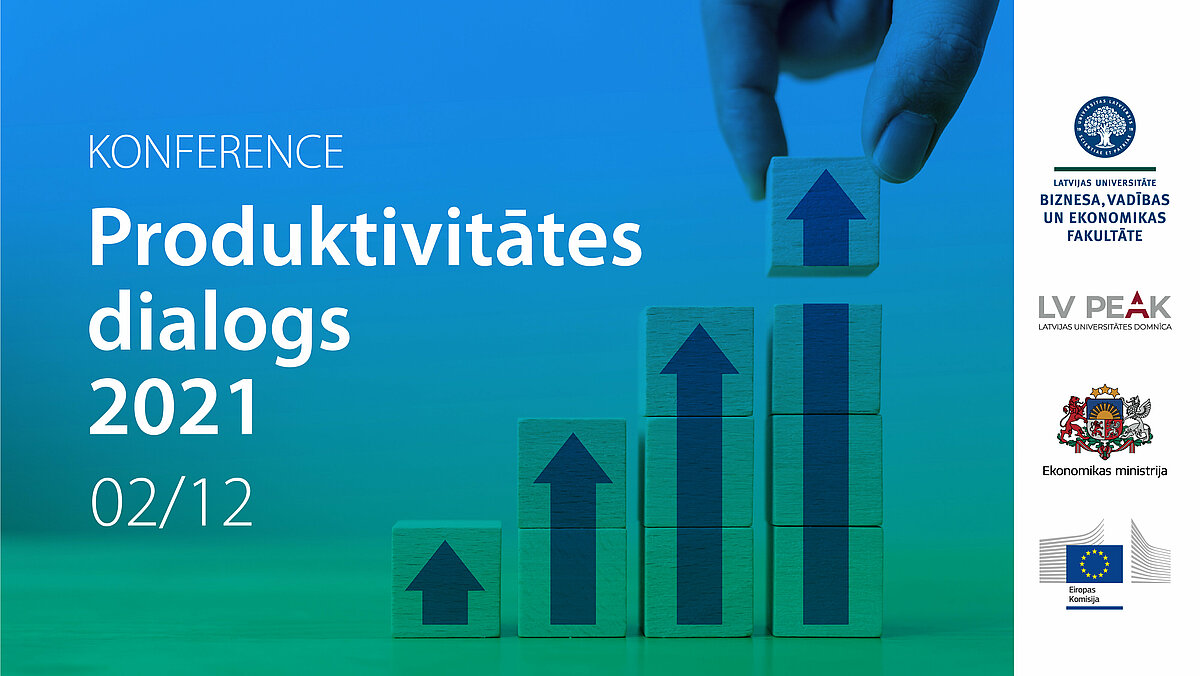
On December 2 the conference “Productivity Dialogue - 2021” organized by the Latvian Productivity Board and the Productivity Research Institute of the University of Latvia “UL Think tank LV PEAK” took place. At the conference, participants emphasized the crucial role of the Latvian state in investing purposeful financial resources in raising productivity, innovation and export capacity.
The draft annual Productivity Report was presented at the conference, which was attended by Latvia's leading researchers, politicians, representatives of non-governmental organizations and entrepreneurs. The conference was moderated by the Director of the Productivity Research Institute of the University of Latvia “UL Think tank LV PEAK”, Prof. Inna Šteinbuka. She noted that the “Latvia’s 2020 Productivity Report” has already become a success story, because not only it was the first Productivity Report in Latvia's history, but also because it was written in the context of Covid-19, when the productivity “renaissance” is especially important.
"In order to achieve a breakthrough after the crisis, the state needs to purposefully invest financial resources in raising productivity in order to make the economy more competitive. This means, for example, that the state, by supporting measures to preserve economic potential, helps flagship companies with high added value, as well as fast-growing innovative companies to strengthen or at least maintain performance and export capacity” at the conference emphasized Prof. Inna Šteinbuka.
The conference was opened by Edmunds Valantis, State Secretary of the Ministry of Economics of the Republic of Latvia (MoE), and Arvils Ašeradens, Chairman of the Education, Culture and Science Commission of the Parliament of the Republic of Latvia. Massimo Suardi, Director of the European Commission's Directorate-General for Economic and Financial Affairs, spoke at the conference about the contribution of the Recovery and Resilience Plan’s to Latvia's productivity challenges. But Prof. Gundars Bērziņš, the Chairman of the Productivity Board of Latvia and the Dean of the Faculty of Business, Management and Economics of the University of Latvia, discussed the challenges of the Latvia’s economy during the pandemic.
“Over the last 25 years, Latvia has achieved a significant increase in income levels, reducing the gap with the EU average. In order to continue this successful path of convergence, stable productivity growth in the foreseeable future will be the main goal of Latvia, especially due to unfavorable demographics. Latvia's main productivity challenges are skills shortages, low levels of R&D and innovation, a weak business environment and regional disparities. Latvia's Recovery and Resilience Plan includes a number of reforms and investments, the implementation of which will contribute to addressing these important challenges. This is in line with the objective of the Recovery and Resilience Facility, which was set up to help EU Member States increase their economic potential following the Covid-19 crisis and to embrace the green and digital transition" said Massimo Suardi.
The main recent research in the field of productivity was discussed at the conference, as well as what lessons were learned to maintain productivity during the pandemic and in what directions to work in the future to ensure productivity growth. Leading researcher of the European Policy Research Institute of the Latvian Academy of Sciences, Senior Analyst of the Analytical Service of the Ministry of Economics the Republic of Latvia, Dr. Oļegs Barānovs spoke about the impact of teleworking on productivity in the Covid-19 pandemic. However, the Chairman of the Scientific Council of the “UL Think tank LV PEAK” and the professor of the Faculty of Business, Management and Economics at the University of Latvia, Jānis Priede in his report analyzed Latvia's competitiveness, but Dr. Oļegs Krasnopjorovs, the Deputy Director of the Productivity Research Institute of the University of Latvia “UL Think tank LV PEAK” and Chief Economist of the Monetary Policy Department at the Latvijas Banka, explains the challenges of the labor market.
"Overall figures hide" two-speed Latvia ". In some sectors and occupations, jobs did not decline at all during the crisis, such as education, healthcare, public administration, industry and information technology. However, there is an important part of society and the economy that is in a diametrically opposed situation. Among the sectors and occupations most affected by the pandemic are, for example, the accommodation and catering sector, which has lost a quarter of its workforce during the pandemic. The biggest paradox of the pandemic is that the number of large wage earners has grown significantly during the crisis - since the beginning of the crisis, the number of employees in the private sector with gross wages above 3,000 euros has increased from 20 to 30 thousand” said Dr. Oļegs Krasnopjorovs.
Prof. Juris Binde, the President of Latvijas Mobilais Telefons SIA and member of the Productivity Board of Latvia, at the conference shared his company's experience of working outside the office and how it affects digitalization, productivity and employment. The non-governmental sector was represented by Jānis Endziņš, the Chair of the Board of the Latvian Chamber of Commerce and Industry, and Līga Menģelsone, the General Director of the Employers' Confederation of Latvia, who spoke about productivity and exports.

 CONFERENCE
CONFERENCE